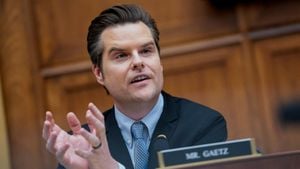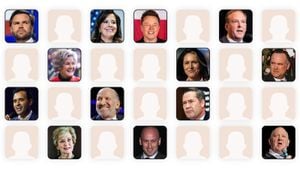Concerns are mounting globally following Donald Trump's controversial cabinet picks, signaling potential upheaval within key government roles as he prepares for his second term as president. With nominees like Tulsi Gabbard for Director of National Intelligence and Matt Gaetz as Attorney General, the political stakes are higher than ever.
Gabbard's nomination has drawn alarm from defense leaders who are wary of her past comments and positions. The former congresswoman and Army veteran has solidified her alliance with Trump and is set to lead America's intelligence capabilities. Some critics have branded her as having pro-Moscow tendencies, raising questions about how she might influence the U.S.'s national security priorities.
Meanwhile, Gaetz, representing Florida and known for his unyielding support of Trump, has been nominated for the top law enforcement position. This choice has bewildered not only Democrats but also many Republicans who stress the need for integrity within the Justice Department. His past, riddled with allegations of misconduct—including investigations over sexual trafficking—cast significant doubts on his candidacy. Senator Susan Collins, typically conservative, voiced her concerns about Gaetz stating, 'I was shocked by the announcement—' It's clear his confirmation hearing will be anything but straightforward.
The array of Trump’s early cabinet picks includes individuals whose viewpoints and experiences starkly differ from traditional political norms. For example, his nomination of Fox News host Pete Hegseth for Secretary of Defense has been met with skepticism. Hegseth has openly expressed opposition to women serving in combat roles, raising flags about the inclusivity and effectiveness of future military policies under his leadership.
Trump's approach projects significant ideological shifts within governmental institutions, as he fills key positions with staunch loyalists. His past calls to ‘drain the swamp’ now paint clearer lines about what exactly will replace the previous administrations’ approach. Critics are already warning of the perilous consequences this could inflict on established governmental checks and balances.
Echoing sentiments from the intelligence community, Olivia Troye, a former homeland security advisor, emphasized the dangers posed by Gabbard, noting, 'Having a Russian propagandist who spreads fringe conspiracies at the helm will likely lead to our allies refraining from sharing intel with us.' Troye warns this dynamic will undermine national security and could result in increased vulnerabilities at home and abroad.
Even among Trump's steadfast supporters, uncertainty looms. Many Republican senators are taking to the media to express their reluctance about Gaetz’s nomination. Senator Joni Ernst indicated the challenges he faces, stating, 'He’s got his work really cut out for him,' underscoring the uphill battle he may face against his own party.
With these developments, Capitol Hill finds itself at a crossroads as Trump aims to reshape the fundamental structures of American governance. His picks speak volumes about his administration’s intentions to prioritize loyalty over typical political etiquette—marking a time when partisan battles will escalate, especially when the confirmation process kicks off.
While some Republican lawmakers, like Senator Lindsey Graham, have pledged support for Trump’s nominations, the fissures within the party remain evident. This internal conflict emphasizes the growing schism as Trump prepares to wield power aimed squarely at his adversaries, both within and outside of government.
The cabinet reshuffle signals Trump’s commitment to enacting his vision for America, one where loyalty reigns supreme. Addressing his supporters, he remarked, 'Of course there’s going to be resistance from the swamp in Washington — I think that's kind of the point.' His rhetoric amplifies the combative atmosphere anticipated as confirmation hearings approach.
Democratic leaders are poised to seize on this moment, viewing Gaetz’s candidacy as not just another nomination, but as part of a larger battle concerning the integrity of governmental institutions. They believe it’s pivotal for Republicans to demonstrate accountability by resisting Trump's more controversial appointments.
Looking across the broader political spectrum, these appointments may redefine the core values and operational structures of federal agencies, stirring significant public discourse about the future of governance under Trump’s watch. Will America see efficiency or chaos? Only time will paint the complete picture as they prepare for what promises to be heated confirmation battles.
With every nomination, Trump recalibrates the political environment, raising fundamental questions about accountability, governance, and American democracy itself. The clarity and direction of his administration now rests heavily on how these nominations are received, both by lawmakers and the general public.
For many, the alarm bells are already ringing, as these nominations could lead to far-reaching consequences, reshaping the political arena for years to come. Will the Senate rise to the occasion to safeguard democracy, or yield to the whims of loyalty over integrity? Only the impending confirmations can reveal the answer.



